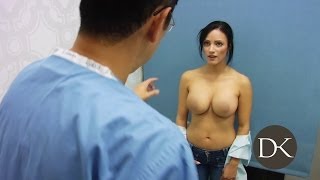Wednesday, 14 January, 2026г.
















Где искать: по сайтам Запорожской области, статьи, видео ролики
пример: покупка автомобиля в Запорожье
My Boob Job Story | 250cc Implant | The Risks Can Come True
In the video I said I had 150cc & 175cc implants, I meant 250cc and 275cc, sorry for the confusion!!
http://krazykirstyb.blogspot.co.uk/2015/01/boob-job-breast-augmentation-story.html
I think I did a better job at writing down my story than explaining it in this video.
https://www.facebook.com/krazykirstybrowne
So basically, I had a boob job in May 2014, I had fluid build up which is called Seroma and a blood clot during surgery which is what can cause the fluid to build up which makes the breast become very swollen. So I had to visit the doctor many many times for hi to leak the fluid from my breast and he had to squeeze them to empty the fluid out. Then I also got capsular contracture which is when your body is trying to reject the implant and a big blister which leaked fluid. So I ended up having revision surgery and even though I still have capsular contracture in my right breast it's not as bad as it was before.
My teeth story when I puked up my denture =-p
https://www.youtube.com/watch?v=xGPYHruMfts&list=PLdVBktpIuOJOY6eMN3rAcRiR6jvh3pvw-&index=4
Capsular contracture
After having a breast implant, your body will create a capsule of fibrous scar tissue around the implant as part of the healing process. This is a natural reaction that occurs when any foreign object is surgically implanted into the body.
Over time, the scar tissue will begin to shrink. This shrinkage is known as capsular contraction. The rate and extent at which the shrinkage occurs varies from person to person. In some people, the capsule can tighten and squeeze the implant, making the breast feel hard. You may also experience pain and discomfort.
Capsular contracture is an unavoidable complication of breast implant surgery. Everyone who has breast implants will experience capsular contracture to some degree and it is likely further surgery to resolve the problem will be needed in the future.
Capsular Contracture
Capsular contracture is the hardening of the breast around the implant. It can occur in the tissue surrounding one or both implants. This hardening causes the tissue to tighten, which can be painful.
Capsular contracture may be more common following infection, hematoma and seroma. However, the cause of capsular contracture is not known.
There are four grades of capsular contracture, known as Baker grades.
Baker Grading Scale
Grade I: Breast is normally soft and looks natural
Grade II: Breast is a little firm but looks normal
Grade III: Breast is firm and looks abnormal
Grade IV: Breast is hard, painful, and looks abnormal
Grades III and IV capsular contracture are considered severe, and may require reoperation. The surgical procedure usually involves removal of the implant with or without replacement of the implant. There is a possibility that capsular contracture could occur again after surgery to correct it.
Seroma
After having breast implant surgery, fluid can build up around your implant. This is known as a seroma and is fairly common. Further surgery may be needed to drain away the fluid in severe cases, but most seromas resolve without needing to be drained.
Creasing and folds
Sometimes a breast implant can affect the appearance of the skin on your breast. For example, after your operation you may find your skin has creases, kinks, folds or ripples.
Creasing and folds tend to be more common in women who have very small breasts before having breast implant surgery.
Infection and bleeding
Infection and bleeding are relatively rare after breast implant surgery. However, if you are having an implant fitted for breast reconstruction after a mastectomy (breast removal), you may have a greater risk of infection and bleeding.
Most infections can be treated using antibiotics. But if your breast becomes severely infected, you may need to have the implant removed to prevent further complications developing. You should be able to have the implant reinserted after the infection has cleared up.
However, it is important the implant is not reinserted too soon, as this can increase the risk of infection. Waiting a few months after the implant was removed is usually recommended.
Some research suggests your risk of infection and bleeding may be increased if you smoke because your wounds will take longer to heal. Your surgeon may recommend not smoking before your operation to reduce the risk of developing complications.
Теги:
boob job breast augmentation big boobs implants breast seroma fluid fluid build up capsular contracture blister blood clot Hematoma (Disease Or Medical Condition) strapping surgeon dr frati MYA Plastic Surgery (Medical Specialty) complications risks the boob god natural looking 250cc 275cc silicone implant mentor implant high profile swollen boob swollen breast swelling bruise breast massage rippling leaking brown fluid revision surgery
Похожие видео
Мой аккаунт


 У вашего броузера проблема в совместимости с HTML5
У вашего броузера проблема в совместимости с HTML5


